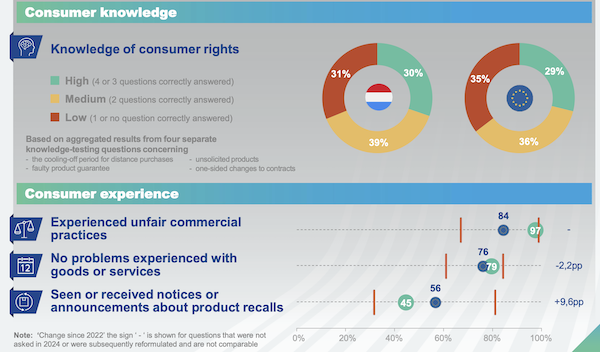 Consumer Conditions Scoreboard 2025 - Luxembourg Fact Sheet;
Credit: European Commission
Consumer Conditions Scoreboard 2025 - Luxembourg Fact Sheet;
Credit: European Commission
On Friday 28 March 2025, the European Commission released the Consumer Conditions Scoreboard 2025, a report analysing recent trends in consumer experience and behaviour within the Single Market, including Luxembourg.
Key findings indicate that while e-commerce continues to grow, consumers face an increasing number of challenges. Online shoppers are over 60% more likely to encounter issues with their purchases compared to those buying in physical stores.
According to the report, concerns about online targeted advertising remain prevalent, with 93% of online shoppers expressing apprehensions. Specific concerns include the collection of personal data without consent (71%), excessive advertising (67%) and unavoidable personalisation (63%). Additionally, 45% of consumers reported encountering online scams in the past year, while many faced unfair practices, such as fake reviews (66%) and misleading discounts (61%).
Luxembourg’s Directorate for Consumer Protection reported that based on a representative survey, the report includes detailed country fact sheets. The "Fact Sheet Luxembourg", which provides insights into the consumer landscape in the country, highlights several key findings. Compared to the European average, consumers in Luxembourg generally place greater trust in professionals and public authorities. Notably, 53% of Luxembourgish consumers consider responsible consumption and product reparability in their purchasing decisions, compared to an EU average of 43%, noted the report.
The report also highlights the rise of e-commerce while emphasising associated risks. Online shopping habits in Luxembourg were found to be broadly in line with those across Europe, except for purchases from domestic sellers. However, Luxembourgish consumers face a higher incidence of attempted online fraud.
The findings of the Consumer Conditions Scoreboard 2025 will now be discussed with Member States, consumer organisations and businesses to help shape future initiatives, such as the Consumer Agenda 2025-2030 and the Digital Fairness Act, according to the Directorate for Consumer Protection.
IK








